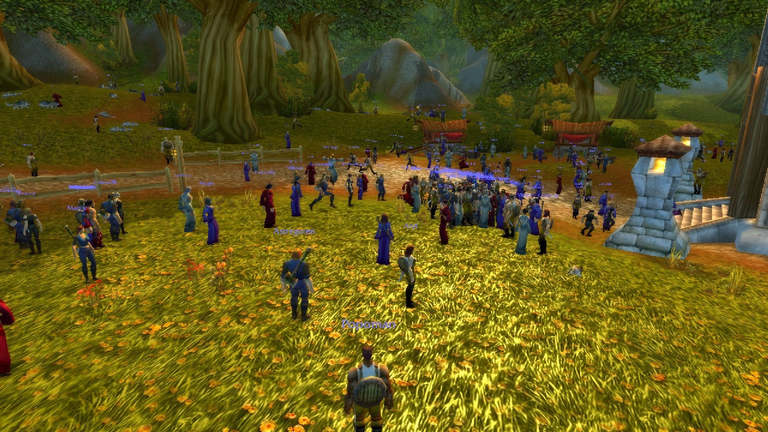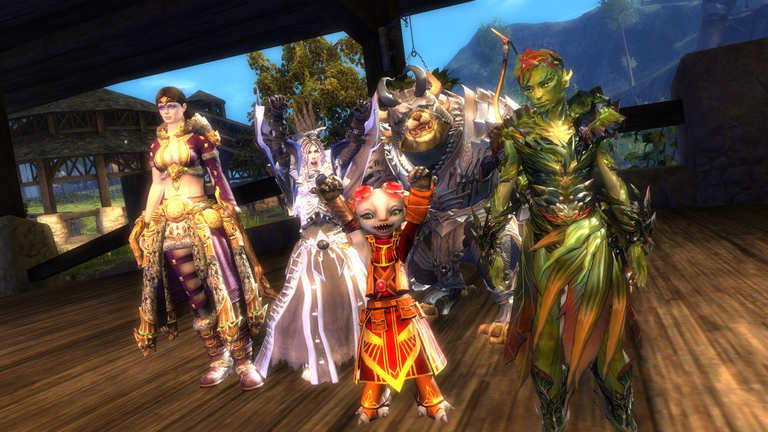Since the beginning of 1997, the year when the first online role-playing game "Ultima Online" came onto the market, the number of people on the servers has grown rapidly.
What makes them different from the majority of other players? For example, is escapism the motive, or are these players shy people who find it easier to socialize in virtual life?

Ultima Online img source
Why people play
Playing is undoubtedly one of the most important cultural achievements of man. Almost all areas of life are interspersed with playful content:
Children play in the sandbox, musicians play their instruments, lovers play with their eyes, demagogues play with words and gestures.
But the game is not always recognized as a cultural achievement.
Computer games in particular are an excellent example of a cultural asset that has great difficulty in public perception in being accepted as such - the German video game market is one of the largest in the world.
Games are more than a biological and psychological function of the body. Games are a factor in people's cultural life, affecting all areas of human coexistence.

World of Warcraft img source
Why are computer games so fascinating?
A common concept used to explain why people play computer games is "structural coupling". The most important determinant of the fascination of computer entertainment is the possibility of exerting power over and controlling a virtual world.
For some players, however, this fascination can turn into gambling addiction.
See one of my previous posts: Games and the addiction trap
In role-playing games in particular, players are transported into a world that appears to run parallel to reality and lasts forever. This infinity fiction also suggests to the role-players that their achievements will last forever.
According to the current state of research, the aspect of exercising power, dominance and control over what is happening in the game can be seen as the central determinant of the fascination of computer games.
For example, in many strategy games the elements “build a base – produce units – destroy opponents” are of central importance, you see what is happening from the “God perspective” from above.
People want to exercise power and control not only in the virtual but also in the real world. The concept of structural coupling succeeds in bridging reality and virtuality: people find control motives in games (e.g. order, fight, completion, expansion), take them up and then try to prove themselves in the game.
For example, if a person's life is characterized in particular by the motive "completion", it will also be found in the favorite game.
This is not a causal relationship, but rather a parallelism between the real world of existence and the virtual game world.
Maintaining relationships in a guild
In guilds there is more interaction between the players.
Contacts with partners, friends and family far outweigh the importance of the guild and the online community (fortunately).
The quality of online relationships can be compared to those with work colleagues or classmates.
With increasing gaming consumption, the importance of virtual contacts becomes more pronounced, but even with excessive gaming behavior these values usually do not reach the level of real-world contacts.
In general, the following points are seen as valid
- Membership in a guild encourages game consumption.
- The number of friendships found through playing increases game consumption.
- The game consumption among the guild members is particularly high when the contacts there are considered to be of high quality (at least on a par with the real-world contacts).

Guild Wars 2 img source
So what drives people to play a lot or even excessively?
What factors drive gaming consumption up?
The desire to achieve mastery is directly dependent on the level of gaming consumption.
In the language of "us players", this results in a "pro gaming behavior" that young men in particular display.
Women, on the other hand, play more often out of the motivation to chat with others and get to know people.
As with offline games, these phenomena can be interpreted as an effect of "parallel coupling", according to which real-world life contexts are transferred to virtual life in a gender-specific manner: since competition and armed conflicts play a more important role in the life-world of young men than in females, male players show more interest in gaining experience points and virtual clashes.
Maintaining relationships with virtual friends can be cited as a second important factor for high gaming consumption.
When friendships are made online, they are often found manifested in guilds.
The maintenance of new acquaintances is expressed through regularly recurring interaction - in this case through "playing".
The repeated interaction in the virtual creates a space of trust, so that virtual contacts are often seen as qualitatively equal to the real world. This has a positive effect on gaming consumption.
Personally, I am clearly one of the "frequent gamers" and spend numerous hours in various games.
Role-playing games, city building games, shooters, everything is included.
And I totally agree that on the one hand it has a simple relaxing effect on me and on the other hand it allows me to do things that I just won't experience under normal circumstances.
At least I haven't had to fight a dragon in my garden so far...
The rewards earned on this comment will go directly to the person sharing the post on Twitter as long as they are registered with @poshtoken. Sign up at https://hiveposh.com.
This is a topic I've come to think about quite a bit before: what psychological aspect makes us feel comfortable playing something that takes hours and hours to only make a little progress? I'm more of a believer in the feeling of satisfaction for having reached achievements or goals that require hours of play.
Still no dragons where you live? Here I've already fought Cyclops that enter my apartment without permission :P
🤣 Nah. Every MMO I play, I avoid people unless I want to sell them my goods for exorbitant prices.
Couldn't tell you what type of gamer I am and why I play, just that I ignore the war genre of games like CoD and Battlefield. xD I could play Peggle one day, City Skylines the next, then Mass Effect, Elder Scrolls, some random MMO, some random simulator, then Plants vs Zombies before I dive into some indie thing that no one has heard of. Definitely favour the RPGs though.
Your analysis is very good and basically in the computer games that were the ones that started this explosion of consoles that little by little catch more people.
I've been a gamer since I was 6 years old and I'm 38 now, I've always spent time playing without going over my obligations in the real world and without going over my relationships. however, the addiction to play grows on certain occasions and will depend a lot on the game that we are playing at the moment.
I am a psychologist and I could assure you that the majority of true gamers, myself included, have introversion as a basic personality structure, this means that the chances of getting more hooked on games is very high, because there are many things that are not we do in real life out of grief or fear that make us immerse ourselves more in the relationships we create in games and with other online players, it could be relative, yes, but personality greatly influences the hours we spend playing and obviously our moods as a second factor in this theory.
This lends itself to a longer and more complex analysis because video games are already a profession and a couple of years ago the W.H.O included video game addiction as a mental disorder, rather there is much to investigate and also to delimit...
Greetings friend, it was very interesting to read you, happy week 👊😎🔥🎮❤️🌟🍻💥💫💯
I read this post for far to long before I realized this wasn't about actually getting stuck, as in not being able to progress.
Would be an interesting post. "Why Do We Get Stuck In Games - aka How To Git Gut" :D
Haha! Same~ !LOL
There's a difference between getting stuck in the gaming world, and being fascinated by it without leaving your real world self behind.
I heard somewhere that "If you're so addicted to games that you it's harmful to you and others, it's almost always an external problem, (to the games themselves, it might be an internal one in you.)"
!PIZZA !LUV !LOL
@ahmadmanga(2/4) gave you LUV. H-E tools | connect | <><
H-E tools | connect | <><
Tap to help.
PIZZA Holders sent $PIZZA tips in this post's comments:
@ahmadmanga(2/5) tipped @wirago (x1)
Join us in Discord!
It changes so drastically from person to person, gender divisions don't really make justice to the different sociological groups this kind of phenomena generate. Video games is such a vast field for the human study I just can't get enough of posts like these, keep on!